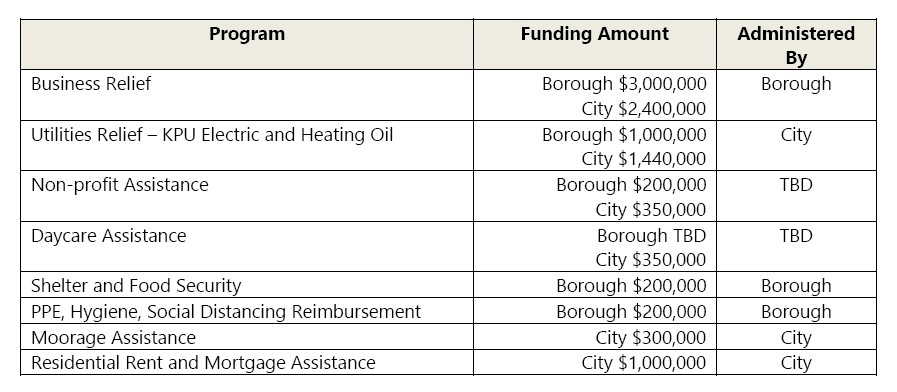
This chart released Friday by the Ketchikan Gateway Borough shows the programs funded through the city’s and borough’s CARES Act allotments. It’s not clear when applications will be available. (Screenshot by Eric Stone/KRBD)
The Ketchikan City Council approved a spending plan for nearly $6 million in economic aid Thursday. Much of that’s for small businesses and relief for public utility ratepayers. But some on the council said businesses were getting too much.
$6 million sure sounds like a lot of money. But Ketchikan’s city leaders had to grapple with the fact that there’s a lot of need and the relief will have to be spread pretty thinly.
The package proposed by City Manager Karl Amylon, Emergency Manager Abner Hoage and Finance Director Bob Newell includes $2.5 million for businesses, $1.4 million for utilities, $1 million in housing payment assistance, $350,000 for nonprofits, $350,000 for child care, and $300,000 in harbor fee relief.
“This money, unfortunately and in reality, isn’t going to probably save everybody. That’s the case. It’s going to help,” said Mayor Bob Sivertsen. He argued it was important to get the first half of some $12 million in federal aid out as quickly. He said he didn’t want to get “bogged down in the details.”
But several on the city council said it was worth discussing. Council Member Mark Flora said it was important to minimize overlap. Ketchikan’s borough assembly recently approved its own utility and business assistance programs.
“I would like to know what my peers think as far as the ratios or allotment of this money,” he said. “Should we take this model and get going, or do we want to have a short discussion of an adjustment to where these funds go?”
Sam Bergeron said he’d be happy to use some of the city’s money for business assistance. But he said he was concerned businesses were getting as he put it,“the lion’s share.”
“When I was going through the percentages on this, I was dismayed that there was such a low percentage on the homeless,” he said.
He suggested $350,000 for nonprofits serving seniors, the homeless, and the hungry wouldn’t be enough.
Council Member Emily Chapel agreed with increasing the share for nonprofits delivering services. But she argued that mental health should be funded as part of the plan.
“And in turn that is going to help our businesses and the rest of the community because if people are not well, they cannot go to work,” Chapel said.
She suggested carving out a cool million for nonprofit social welfare agencies. That would require $650,000 less for small business assistance. She also said more was needed for child care.
Chapel also suggested bumping up the share directed to utility assistance for residents and businesses.
“If we’re going to say that we’re going to provide revenue replacement for businesses, but not individuals, I don’t like that,” she said. “The utilities seem like an equitable way to benefit both.
But other council members didn’t buy in. Here’s Judy Zenge.
“So you want to take this away from the businesses, but if we help the businesses, that allows people to go to work, and so now they’re now making money so that they can support their families,” she said.
Nobody offered an amendment to adjust the funding formula. Zenge suggested holding a public forum before the next round of funding. 80% of the first portion has to be spent before the next is distributed.
“We’ll evaluate, check out see what we’re doing. I’m sure that the community will be taking our temperature on this and let us know how we’re doing,” Zenge said.
The council voted unanimously to approve the plan as presented. It’s not clear when applications for the programs will be available.





